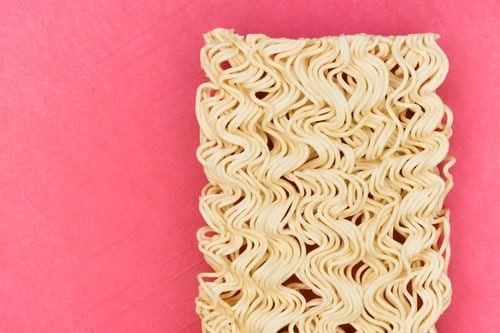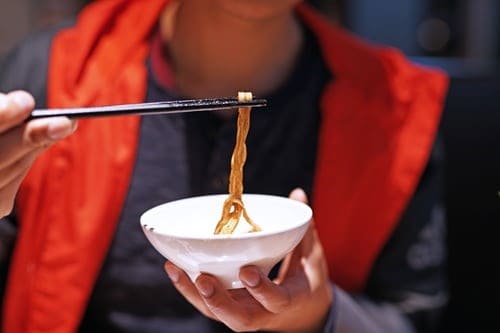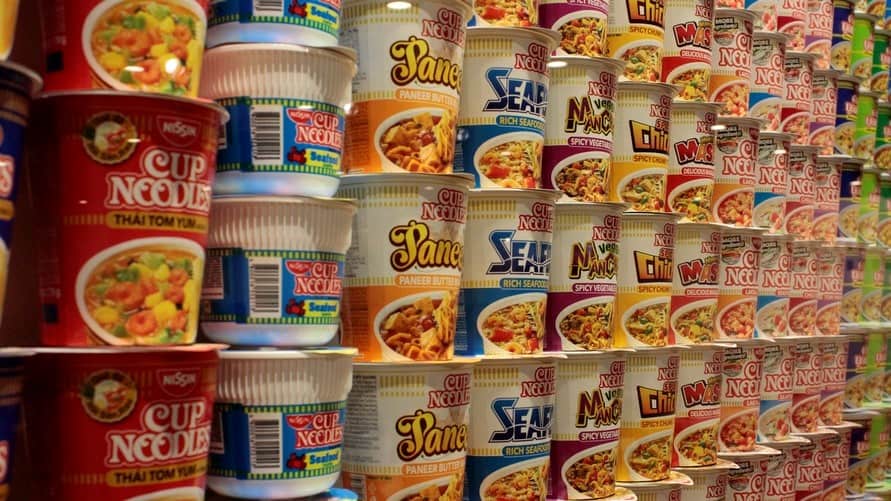The expiration process of the noodles is not immediate. It happens gradually and through minor changes which is why you can get away with eating ramen noodles even up to two months after its supposed expiration. The phases of expiration include:
- Six months after expiration date. The soup will taste bland as the flavor packet loses its potency. The ramen will taste bad overall.
- Eighteen months after expiration date. The ramen noodles will give you an upset stomach. The noodles will taste more like cardboard than food. There will also be strange particles floating in the soup.
- Twenty-four months after expiration date. The noodles will have an unpleasant smell. It will also feel very oily and unpleasant to eat. You can expect some stomach problems afterwards.
Signs That Your Ramen Noodles Are Expired

Expired ramen noodles won’t immediately go bad. You can still consume them a few days or weeks after the indicated expiration date provided that they don’t exhibit signs of expiration, like:
- Unpleasant odor
- Presence of mold
- Discoloration
- Date is past three months of the expiration date
- Weird noodle texture at the first bite
Why Do Ramen Noodles Have A Long Shelf-Life?
Ramen noodles have a long shelf-life because of the dehydrated noodles. This means that there will be no water and oxygen for microorganisms to thrive on. The noodles are deep-fried and this reduces the water content to only three to six percent, thus inhibiting microbial growth.
Ramen noodles are also rich in Vitamin E, which acts as an antioxidant and helps delay the oxidation of the noodles. The flavor packets will expire at a faster rate than the noodles.

How To Buy Ramen Noodles
There are a few things to consider to ensure that you’re stockpiling noodles that will last for a very long time.
Expiration Date
Stockpile noodles with a distant expiration date. This this way, you won’t have to replace them frequently and you’ll be ready for any emergency that requires food.
Packaging

The packaging plays a huge role in the longevity of your ramen noodles. Its quality can mean the difference between an expired pack and a pack that lasts for a long time. Avoid buying noodles with cheaply-made plastic packaging. This will be more likely to get bitten through by ants, pierced by sharp objects, and become penetrated by moisture, which then leads to spoilage.
Go for high-end noodles. Cup noodles may cost a little bit more than regular packs but they’re much more secure and have lower chances of getting infested by ants or rats. These cups, usually made of plastic or styrofoam, have thicker and more durable walls.
Are Ramen Noodles Healthy?
Ramen noodles are branded as unhealthy foods. That is true in a sense. They are loaded with carbohydrates and sodium that can take a toll on your body if you’re eating them very often. However, it’s okay to eat them during survival situations. The sodium will help with water retention so that you can combat dehydration. The carb-loaded noodles will keep you energized and make you feel fuller for a longer period of time.
There are also healthier variants of instant noodles that you can go for. Some of the flavor packets are loaded with dried vegetables and meat to provide nourishment to your body. You can also throw in some fresh vegetables and meat to upgrade a normal cup of ramen noodles.
How To Store Ramen Noodles
Exposure to water and moisture can accelerate the spoilage of your ramen noodles. However, storing your noodles properly can delay their expiration to the very last minute. Proper storage will also protect your stash from ants and mice.
Place the noodles in a cardboard box or plastic container to add another layer of protection. Put them in a cool and dry spot, away from direct sunlight. The location should also have a low humidity. Avoid storing them in a place with inconsistent humidity or near things with strong smell.
